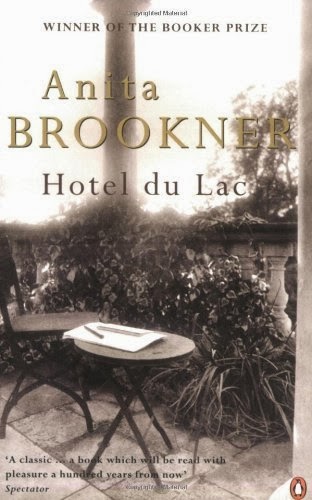REVIEW: Hotel Du Lac by Anita Brookner
After being sent away for committing a public transgression,
romance novel author Edith Hope, who writes under the pseudonym Vanessa Wilde,
finds herself checking into the remote and exclusive Hotel du Lac. Located on a
lakeshore in Switzerland with grey mountain views, the hotel provides a bit of
a sanctuary in which to rest and gather one’s thoughts. The yearly tourist
season is coming to a close and Edith finds herself wrapped in the quiet
solitude needed to honestly analyze her life choices so far and contemplate her
future. Here she is able to work on her latest novel as well as write letters
to David, the married lover she left behind in London.
Soon though, Edith decides to venture from her room and
begins encountering the other guests of the hotel, many of which have been disgraced
or spurned by love in one way or another. Through her eyes and introspective
observations, we meet the interesting and somewhat stereotypical cast of
characters that make up the bulk of the story, including wealthy and
pretentious Mrs. Pusey and her daughter Jennifer, the elderly Mme de Bonneuil
who has been dumped at the hotel by her son, the astonishingly thin Monica who
was sent away by her husband, and the devilish middle-aged businessman Philip
Neville. Beginning as just passive people watching, Edith is soon drawn into
each character’s sphere in one way or another. These interactions, situational
reflections, and recollections through letters allow these characters to fully
develop. From here Brookner builds the slow, perceptive narrative that makes up
this meandering novel of manners.
As is often the case when I read books that have won
prestigious awards, Hotel du Lac has many elements of a well-crafted piece of
literature but isn’t necessarily the most interesting read. Not much actually happens within the short
184-page story, and at first I had a hard time getting into it.
However, once I
realized that the prose was the focal point and let go of my need for
interesting characters or a plot full of action, I was able to ‘get’ what
Brookner was doing. In fact, I’m glad to have read this story for the pure fact
that now I have an example of not having to like or care about a novel’s
characters to enjoy the book. Many readers get caught up in the idea that the
only great stories are those with relatable or appealing characters.
In fact, Hotel du Lac feels off kilter but in an intentional
way. This quiet novel is quite subtle
and depressing and many people will find it boring. The main character Edith
does border on hollow, but Brookner seems to do that intentionally in order to
keep the focus on those around her. I found the females' judgment of other
women, as well as men, particularly disheartening but all too realistic. Forget
‘the man,’ sometimes women can be each others worst enemies.
People love this one, especially women. Now you will notice, Harold, that in my books it is the mouse-like unassuming girl who gets the hero, which the scornful temptress with whom he has had a stormy affair retreats baffled from the fray, never to return. The tortoise wins every time. This is a lie, of course,’ she said pleasantly, but with authority. ‘In real life, of course, it is the hare who wins. Every time. Look around you. And in any case it is my contention that Aesop was writing for the tortoise market. Axiomatically,’ she cried, her voice rising with enthusiasm. ‘Hares have no time to read. They are too busy winning the game.
The purpose seems to be to critique society’s values and
morals by creating characters that typify the stereotypes, especially female,
on which Edith can mull and ponder and question. I enjoyed the meditation on personal
choices and the examination of one’s own life and views as well as of the people that surround you.
Least you think I’m a huge champion of this book, I did find
the whole spinster motif a little tiring. I can't even think of a novel that stars a male spinster, but I digress. While written in the 1980s, the book
read like it was set in the 1940s but there was no indication of a historical
setting. There wasn't much I found particularly witty within the pages, but I enjoyed the read. It was perfect for
weathering this insanely cold winter we’ve been having. In fact, I would say
the book was an accurate match to my mood at the time. Overall, I would call
Hotel du Lac a solid read that is somewhat thought provoking but not life
changing.



Comments
Post a Comment